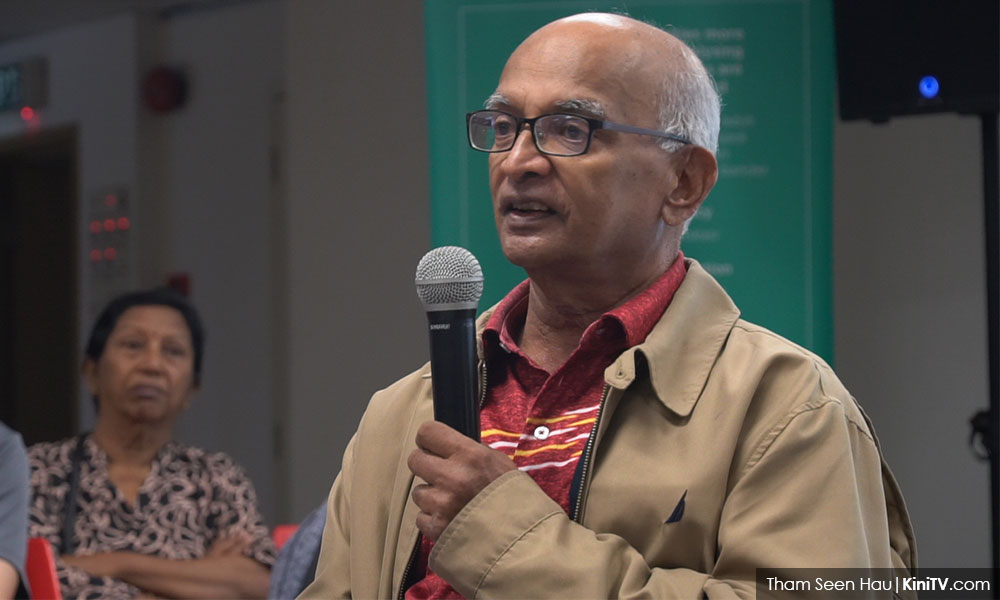At one of his last public appearances, veteran journalist and May 13 riot eyewitness, Johan Fernandez reminded young Malaysians that words could have far-reaching implications.
Fernandez passed away in Kuala Lumpur yesterday at the age of 71.
At an event in June, Johan told an audience mostly made up of those born after 1969 that when it comes to ethnic relations, many forget that their words could incite communal violence.
Recalling his experience coming face-to-face with armed men at the Rex Cinema in Kuala Lumpur that day, Fernandez said he had been very careful in choosing his words when sharing about it even half a century on.
In particular, the former Star Metro editor said, he tried to steer away from focusing on the ethnicities of those involved.
“Maybe I am a coward, but when it comes to these things, when we say things, we have to mean it.
“So (my advice) for young people who say a lot of things - think before you speak. Because once you say those things, there is no turning back,” he said.
Fernandez was speaking at the event "May 13: An Intergenerational Conversation" last June.
The event was organised by Malaysiakini to give an opportunity to young people to speak to eyewitnesses of one of the most pivotal incidents in Malaysian history.
It was part of the
news portal’s coverage to commemorate the 50th anniversary of the incident which killed at least 196 people.
The project also included an
oral history project, where the portal collected stories submitted by readers on their own May 13 experiences.
Other speakers at the event were filmmaker Hassan Muthalib and former deputy police chief of Kuala Lumpur Foong Yee, both of whom
witnessed the riot.
Facing armed men
Fernandez said on that day, he had gone to watch the film Rachel at Rex Cinema with a friend, but just 15 minutes into the film the screen went black and the words "Darurat, Jangan Keluar" (state of emergency, do not exit).
This caused a panic and cinema patrons rushed to the exit to find the staff struggling to pull the grills to stop a mob carrying sharp objects from entering the premises.
Fernandez said he followed the crowd as everyone rushed to hide in the toilets, but he was unwilling to die in such a place and he decided to find an escape only to be confronted by a group of men carrying axes and saws, who had broken into the cinema.
He said the men were confused when they saw him and were unsure what to do because they could see he was Indian, and they had only wanted to attack people of a certain ethnicity.
While they argued among themselves, Fernandez said he slipped pass them and found his way to the Jalan Bandar police station.
Unable to return home and forced to stay at a police mess in the days that followed, Fernandez heard many stories from police officers returning from duty during the riots.
“But these stories, I never spoke or wrote about it because if you want to say something, you must verify the source,” he said.
‘Young people, read those books on May 13’
Similarly, he said, instead of relying on social media or blogs to understand May 13, he said, young people should return to the many books written about the incident during the era.
“It’s all in the books, so many books have been written, and you can get different viewpoints from various writers on their take on May 13….So young people, read those books,” he said.
A consummate newsman, Fernandez shared a conversation he had with The Straits Times (Singapore) production editor TS Khoo, to illustrate to the young audience how words and pictures could have ugly consequences.
In the conversation, he said, Khoo talked about his decision to publish on the front page a photograph showing a dramatic Singapore courthouse steps incident in the custody battle for Dutch girl Maria Hertogh.
This sparked a riot in 1950, which killed 11 people.
Khoo said that decision to publish the image was his one regret as a newspaper editor, Fernandez recalled.
“He said no matter how great a story, no matter how brilliant a picture, it is not worth it if it is going to cost a single life.”
Fernandez started life as a journalist at the New Straits Times before joining The Star.
He served as The Star’s correspondent in New York between 2002 and 2006 and also worked at the Malay Mail.


No comments:
Post a Comment
Note: Only a member of this blog may post a comment.